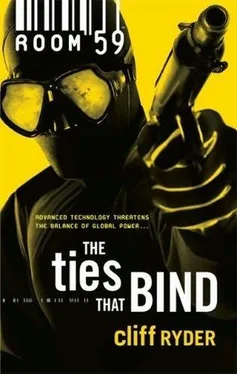"When I was a little girl," Tina said, "my dad would take me down there to dig for clams. We would wade out in the mud up to our hips with little shovels and buckets, searching out our dinner. Look over there." She pointed to one edge of the cove.
The ocean waves that were rolling in at that point took on a life of their own, rising up higher than a normal wave and crashing into the rocky edges.
"When the tide is out, the mud is soft and supple and easy to dig in, but unlike other places, the tide doesn't come in gradually here. It comes in as a wall of water, and in front of it, the temperature is subzero. Just before the tide comes in, the mud turns as hard as cement."
"You're joking," he said, amazed. "That fast?"
"Not in the least and please don't test the theory. More than one person has died in that very cove because they did not get out quickly enough. Our tide charts here aren't just for boats, but for people, too. A lot of folks still get their clams down there. They have to know for sure when the tide is coming in so they don't get stuck out there. A rescue is…difficult at best." She handed him a small sheaf of papers. "Here are the tide charts, which I thought you might want."
"Thanks," he said, taking the papers and slipping them inside his coat. "That's important information and I won't forget it. I'll be sure and include it in all of my data. I can actually set my watch with that kind of information."
Jason took out his GPS tracker. More than just a location device, it had a high-focus laser pointer that could assign satellite-coordinated grid coordinates of anything he aimed it at. It was a lot like using a laser to paint a bomb target, but instead of an explosion, the information he was painting would feed into the handheld device and create a virtual map. From there, he could use it to send the information back up to the satellite and get the data to Room 59. They would use the coordinates to arrange for his supply drop.
As he worked, Tina watched in silence, then said, "That's not like any other GPS system I've ever seen. How does it work?"
He briefly explained some of the device's more basic functions, leaving out that he was actually communicating with anyone, but including that it worked in tandem with a mapping satellite.
She whistled. "Very high-tech," she said.
He nodded, watching the final coordinates upload, and decided to change the subject. "So with the navy and coast guard patrolling these waters, not to mention all the national and corporate interests in this part of the world, how is it that a low-tech group like the one that we encountered the first day can manage to run a smuggling operation without being found out?"
"Easy," she said. "The people around here know the waters and the land. All of this may look small on a map, but it's a vast amount of space and there are limited resources — even for the military. Plus, there are a lot of things that go unnoticed when it comes to the villages. People just assume that we are a bunch of uneducated natives and leave us alone. But what they don't realize is that even if the heart of biological science isn't here, there isn't a single person in the world who's going to know more about the ocean or the creatures that live in it than the people right here in this village. And it's not because they are well read or have some mystic, native powers, but because the information has been passed down from generation to generation."
Jason pulled his binoculars from his pack and peered through them, looking at the next cove over. The houses stopped before then, but a small road led down to the water's edge.
"What's that over there?" he asked.
"The next cove?"
"Yes," he said.
"The villagers call it Blue Whale Bay. The water over there is deep, but sometimes when the tide goes out, animals can get stuck. A long time ago, a baby blue whale was beached there. The mud helped keep it wet, and the villagers did the rest until there was enough water to get him back out to sea. The name stuck."
"Not many people go there?" he asked.
"It's not like this is a hopping tourist spot," she said.
Jason finished inputting his notes into the handheld and marking everything he could until there wasn't enough light left to continue. "Guess that will have to do for a start," he said.
She agreed and they walked back down the slope to his cabin. She stopped at the bottom of the steps.
"What time do you want to start tomorrow?" she asked, a small smile playing over her lips. "I know you've got a schedule to keep."
Ignoring the sarcasm, he said, "How does six sound?"
"Early," she said, "but I'll be here." She waved then turned and moved off into the darkness. Clearly, she was going to try a different set of tactics to get the information she wanted.
Jason watched her retreating form for a minute more and then went into his cabin and shut the door, locking it behind him. He pulled the handheld out of his pack and hooked it to the laptop he'd set up on the small kitchen table. Syncing the data he'd gathered, he quickly created a four-dimensional map of the area. Such maps weren't commonly used, but including the approximate time between each point on the map would make it easier for them to time the drop. He added the tidal-chart information Tina had given him.
The far side of Blue Whale Bay would make for a good drop location. His mapping device showed several small caves in the area and he would be able to camouflage the rest of his supplies underwater. It was likely that Tina wouldn't even know about all the caves, since several were below the water's surface.
Jason chose the exact drop location, accounting for the tide, and transmitted the signal to the offshore team and the satellite, so Denny would know what was going on. He would rendezvous with them a little after midnight to pick up his equipment. Finally, he typed a quick situation update for Denny, including the information about the smugglers, and sent it off via the Room 59 back door that was built into the mapping satellite. Then he closed the computer, locked it and placed his sensors around the cabin.
He wanted to get a couple of hours of sleep before the real work began.
Jason looked at his watch one more time as he checked the gear he would take with him. He had to accomplish the drop without being seen or heard. Selecting clothing he'd picked out specifically for this mission, he chose to use the new extreme-cold underarmor that the Room 59 research team had just developed. It was a highly flexible material that would ward off more than just the cold. A set of black BDUs went over the top, and these, too, had been specially designed to reflect heat back to his body. If someone was using an infrared scanner, he would appear as nothing more than a temperature variant within normal range. He had a light jacket that was the same synthetic material as his underarmor, thicker but just as flexible, and capable of protecting him from edged weapons, as well as from small-caliber arms fire.
He pulled on the light pack and grabbed the small kit off the table, then slipped out into the night. He stayed to the shadows until he reached his ATV. Once there, he reached into the kit and removed two small attachments and screwed them into the mufflers of the vehicle. Using a sound-baffling technology unavailable anywhere else, they would render the vehicle virtually silent. He slipped on his sunglasses and switched them over to night-vision mode. With those tasks completed, Jason took off for the bay.
The only sound the ATV made was crunching rocks beneath its tires. He maneuvered it slowly around the outskirts of the village, over the rise and back down to the shore of Blue Whale Bay. No one appeared to be following him. He climbed off the quad and pulled an ultraviolet beacon from his bag, placing it in the rocks. The signal that he sent earlier should have brought the offshore team close, but this would give them pinpoint accuracy.
Читать дальше
Конец ознакомительного отрывка
Купить книгу












